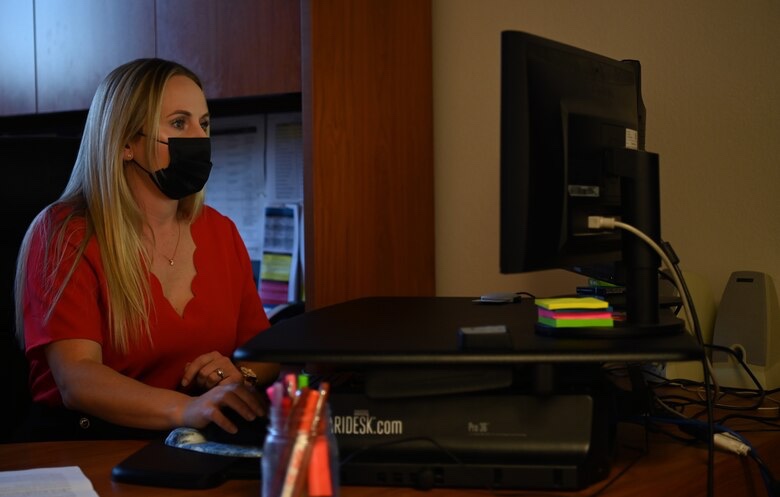VANDENBERG SPACE FORCE BASE, Calif. —
The process to maintain a security clearance has changed and the Information Protection office is moving from periodic reinvestigations every five to 10 years towards a Continuous Vetting program. The program protects the trusted workforce in real time and eventually do away with reinvestigations. Information concerning the 13 Adjudicative Guidelines that used to be reported on the Standard Form 86 is now immediately reportable.

Kayli Bates, Space Launch Delta 30 information protection office personnel security program manager, Oct. 27, 2021, at Vandenberg Space Force Base, Calif. Bates is working on her computer handling all matters from security clearances to debt delinquencies, as well as, any abuse to drugs and alcohol. (U.S. Space Force photo by Airman 1st Class Tiarra Sibley)
The Personnel Security Program Manager for Space Launch Delta 30 Information Protection office is Kayli Bates and she works specifically with personnel security. Bates also works directly with the Department of Defense Consolidated Adjudications Facility and she submits reportable information in the form of an incident report through Defense Information System for Security. DISS is a web-based application that provides secure communications between adjudicators and security officers which allows users to request, record, document and identify personnel security actions.
Continuous Vetting involves regularly reviewing a cleared individual’s background to ensure they continue to meet eligibility requirements and should continue to hold positions of national security. Automated record checks pull data from criminal, terrorism, and financial databases, as well as public records, at any time during an individual’s period of eligibility.
There are several ways information can be reported: self-reported by the individual, directly from the unit commander or first sergeant, from DoD CAF and local law enforcement reports. Once the information is reported, a clearance is not immediately suspended or revoked by the DoD CAF. However, the unit commander can suspend access while incident documentation is being gathered by the subject. The DoD CAF is the sole authority for final adjudication of the information.
“I handle all of the incident reporting, I deal directly with the DoD CAF and input all security related information into DISS, which is now the system of record for security clearances,” said Bates. “We process incident reports, conduct reinvestigations for secret and top secret clearances and submit finger prints for any upgrades if someone is moving from a secret to a top secret position.”
Any information that was previously reported on the SF 86, during a reinvestigation that falls within the 13 Adjudicative Guidelines, is now immediately reportable to the unit security assistant. Some examples include: unofficial foreign travel, foreign contacts, foreign activities, cohabitation/marriage to a foreign national, bankruptcy, failure to file/pay taxes, traffic violations exceeding $1,000, infusion of assets over $10,000, debts over 120 days delinquent, any abuse of alcohol/drugs or enrollment of related treatment, any arrests or criminal conduct, apparent/suspected mental health issues, misuse of U.S. Government property or IT systems and any activity that questions an individual’s reliability, trustworthiness, or loyalty to the Unites States.
“The sooner the information is reported and especially self-reported, gives me the opportunity to work directly with that individual and gives us more time,” said Bates. “So the faster information is reported, the longer I have to make sure that they are submitting a solid package to the DoD CAF.”
Continuous Vetting identifies potential problems by raising a red flag in the form of an incident report which is not always negative. This process allows Bates to work directly with the unit, security assistant individual and the DoD CAF to gather a solid response to submit for adjudication. If the issues have not been mitigated, the DoD CAF will likely suspend or revoke clearance eligibility when a cleared individual’s loyalty, trustworthiness or reliability comes into question.
“Most importantly, the major difference is all of the information that used to be reported on the SF 86 every five or 10 years,” said Bates. “That would fall within the 13 Adjudicative Guidelines is now immediately reportable.”
Security Executive Agent Directives 3 and 4 which outline the 13 Adjudicative Guidelines and Reporting Requirements are located on the Director of National Intelligence website and unit security assistants can also assist.
By Space Launch Delta 30 Public Affairs


“Infusion” of $10,000? It’ll be fun watching them chase their tails every time someone sells a car or house.
I don’t think the financial transaction tickler applies to mortgages or assets etc. because those will have legitimate documentation, it is cash transactions/deposits without any explanation. I have an insurance claim deposit from like 2009 which was over $10k, and it still comes up every time during my re-investigations, so I have to explain the same story.
Exactly my point. Legit, but you gotta refresh your memory and roll out the whole obscure story from a decade ago. And God forbid if you don’t remember exactly and in some future investigation you tell the tale slightly differently.